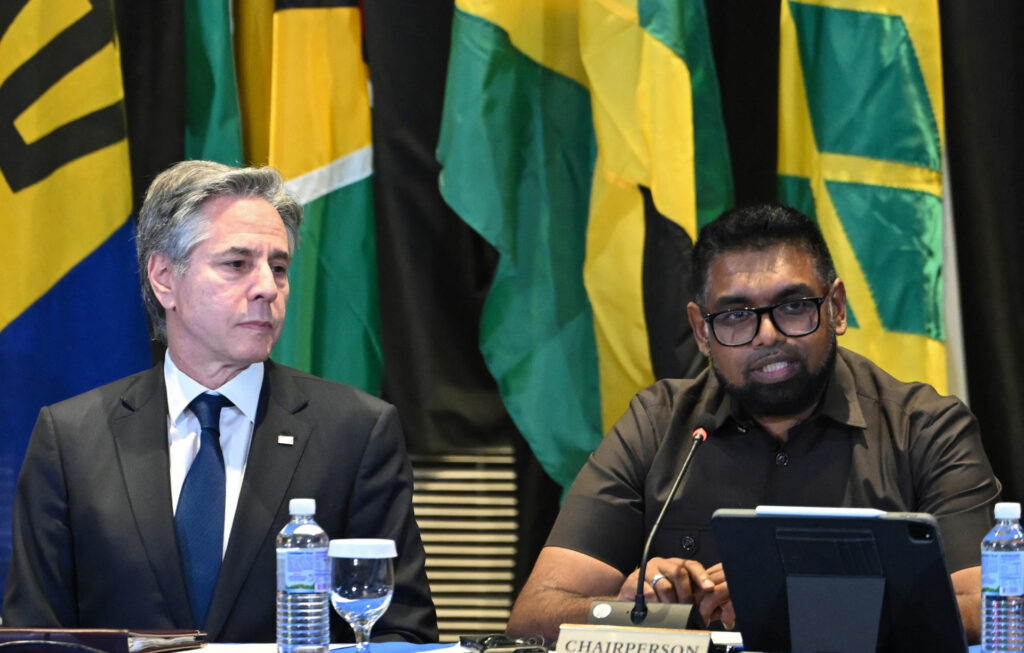Haitian Leaders, 'Barbecue' Reject Blinken-Backed 'Presidential Council' Plan
 CLARENS SIFFROY/AFP via Getty)
CLARENS SIFFROY/AFP via Getty)
Multiple political power brokers in Haiti – and the country's most prominent gang boss, Jimmy “Barbecue” Cherizier – vocally rejected a plan on Wednesday enthusiastically backed by the administration of President Joe Biden to create a “Transitional Presidential Council” to replace outgoing Prime Minister Ariel Henry.
Haiti, an unstable country for decades, is experiencing an especially violent wave of chaos this month following Henry's trip to Kenya to seek aid in the form of Kenyan police participation in a security support mission to stabilize the country. Henry has been prime minister since 2021, when then-President Jovenel Moïse appointed him days before assassins gunned him down in the presidential estate. Haiti has not had a president since Moïse's assassination.
Upon Henry's departure to Kenya, criminal gangs led by Cherizier orchestrated a massive prison break that put an estimated 4,000 violent criminals on the streets. The armed militias surrounded the airport, stranding Henry in Puerto Rico, and Cherizier announced that his gangs would facilitate a “genocide” if Henry did not resign. Henry announced he would resign days later, but only on the condition that a “Transitional Presidential Council” be established to replace him and organize a presidential election.
As of Wednesday evening, the possibility of establishing a functional Council appeared dim, as multiple parties invited to form it rejected the plan as unacceptable foreign intervention. Opponents noted that the Council plan was concocted and adopted during a meeting on Monday of the Caribbean Community (Caricom), attended by American Secretary of State Antony Blinken.

U.S. Secretary of State Antony Blinken (L) listens as Guyana President Irfaan Ali (R) speaks during an emergency meeting on Haiti at the Conference of Heads of Government of the Caribbean Community (CARICOM) in Kingston, Jamaica, on March 11, 2024. (ANDREW CABALLERO-REYNOLDS/POOL/AFP via Getty)
Among those rejecting the plan is Guy Philippe, one of Haiti's most prominent political figures following his overthrow of former President Jean-Bertrand Aristide in 2004. Philippe was elected senator in 2016 but was indicted in a U.S. court and extradited to America, ultimately being convicted on charges of laundering money originating in Colombia's illicit cocaine trade. The Biden administration deported him in November 2023, allowing him to return to political activity in Haiti.
Philippe's participation in the Transitional Presidential Council is a “non-starter,” the Miami Herald reported, because he has a criminal record; Caricom agreed to ban convicted felons from joining the Council.
Philippe published a video on social media on Tuesday claiming the Council is a conspiracy to “ridicule the Haitian people” by deciding their future.
“Since the departure of President Jean Claude Duvalier, the international community has been the architect of all the ills of our people. It takes total and real control of the decision-making power with the sole objective of’sinking Haiti into the abyss,” Philippe proclaimed, according to the Haitian newspaper Le Nouvelliste.
Philippe declared himself the leader of a “revolution” that he claimed was increasingly close to seizing power in the country, and encouraged supporters to “mobilize” against Caricom.
Voice of America reported on Wednesday that his supporters “took to the streets of Jeremie, in Haiti’s south, to protest the plan,” but apparently not in any sufficient number to further destabilize the country.
Philippe boasts the support of Cherizier and his coalition of gangs, G9 and Family, who reportedly formally rejected the Council on Wednesday and declared their support for Philippe to lead the country.
Also rejecting the Council plan is the head of the Platfòm Pitit Desalin party, Jean-Charles Moïse, who also protested Philippe's exclusion from the body.
“This same government we just kicked out of the country, and now CARICOM is asking for us to go negotiate? For us to go sit down with this government?” Moïse said on Wednesday. “I can’t understand what CARICOM is asking of us … We reject it.”
Moïse announced that his party was “going to install [its] own presidential council,” which would include Philippe, to rival the internationally backed group.
Blinken, in comments to the press on Wednesday, did not address the discord surrounding the creation of the Council, describing it as a promising plan to restore order in the country.
“A transitional presidential council – or college, as they call it – is being stood up. It’s inclusive; it brings together most of the major parties in Haiti as well as other key stakeholders like the private sector, like the interfaith community, and civil society,” Blinken said.
“That council has as its mandate – again, agreed to by the Haitians – to choose a new prime minister, an interim prime minister, to establish a national security council, and to put in place an electoral commission,” he explained. “That creates the pathway, the transition, to elections and to a constitutionally mandated government.”
Blinken claimed the Council plan was “moving forward.”
The Kenyan plan to send police to join a U.N.-backed “Multinational Security Support” (MSS) is contingent upon the success of the Transitional Presidential Council, Nairobi clarified this week, as Kenyan officials do not want to send police into a foreign country that has no legitimate government.
“Without a political administration in Haiti, there is no anchor on which a police deployment can rest, hence Government (of Kenya) will await the installation of a new constitutional authority in Haiti,” Kenyan Foreign Affairs Principal Secretary Korir Sing’oei said on Tuesday, “before taking further decisions on the matter. Kenya reiterates commitment to providing leadership to the MSS.”
Follow Frances Martel on Facebook and Twitter.
Source link

